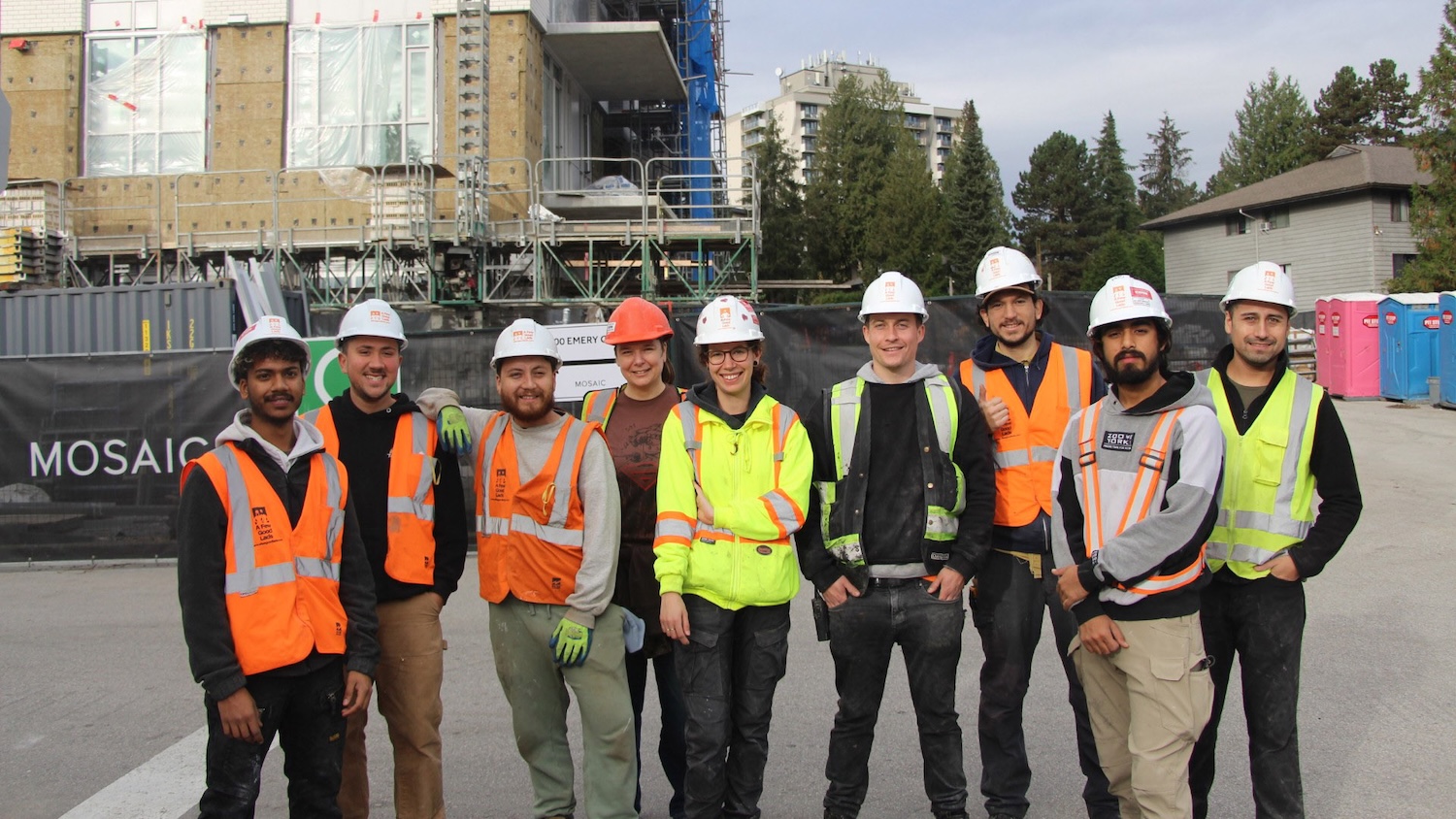
Former ISG staff: where are they now?
Some have moved on, others haven’t. Two former ISG employees tell CIOB People about their journeys since the financial fallout and what they loved about the contractor
After ISG entered administration last September, Brian Donnachie seriously considered leaving the industry.
The year and a half before the collapse had been tough because of the constant rumours about the future of the contractor and its financial health, says Donnachie, who headed health and safety at ISG’s global fit-out business.
Although he was “massively shocked” at the company’s abrupt end, he says, in hindsight, he wasn’t surprised.
“To be perfectly honest, I thought parts of ISG would probably go out of business,” explains Donnachie, who spent nine years of his more than two decades in the industry working for the tier one contractor.
“But other areas like retail or fit-out, which was the jewel in the crown, were very successful and continued to make money, with a healthy forward order book for 2025.
“In quiet conversations with colleagues, we never thought the fit-out business would go.”
His confidence dwindled as the planned sale failed to materialise.

My initial priority was looking after my team. It wasn’t until I landed back in the UK that I had a bit of a panic, if I’m honest
Antipodean Holdings, a company set up by South African entrepreneur Andre Redinger and Australian James Overton, had reportedly been in talks to strike a deal with ISG’s US owner Cathexis for more than six months before the collapse.
However, Redinger claimed that communications “suddenly stopped” on 12 September, eight days before ISG entered administration, despite being “ready to strike a deal that would have secured the company’s future and the jobs of its employees”.
According to ISG CEO Zoe Price, “the purchaser could not satisfy the funding needed to recapitalise the business” and Cathexis was “unable to execute” the company’s refinancing.
Donnachie now believes it was naivety that prevented him and other people in the firm from admitting that, around three or four months before the collapse, ISG was in a critical situation.
So, when the blow finally came, he found time to reflect on his future in the industry – but what he saw in front of him was a disheartening picture.
“I love construction, but one of my biggest frustrations is the number of companies that have gone recently,” Donnachie tells CIOB People. “ISG, Michael J Lonsdale, Buckingham… The list goes on.”
‘This is the industry for me’
After struggling for a while with these hard realities and questioning continuing his career in construction, Donnachie was touched by the positive responses that many in the industry were offering in the aftermath of ISG’s collapse.
“I saw groups of people coming together and companies coming to the rescue and I thought: ‘No, this is the industry for me’,” Donnachie says. “I then decided I wanted to stay and try to make a difference.”
However, for someone of Donnachie’s seniority, used to a certain status at ISG and the benefits that came with it, the hunt for a new job was a daunting prospect – something that hit him after returning from annual leave and discovering news of the collapse.
“My initial priority was looking after my team. It wasn’t until I landed back in the UK that I had a bit of a panic, if I’m honest,” he says candidly.
“I probably didn’t deal with it particularly well. There’s not a huge amount of senior health and safety roles around. I had doubts – did I have the energy to reinvent and prove myself to a new business?”
His doubts proved unfounded as thanks to his contacts in the industry, he soon received two job offers.

Joining Structure Tone
He eventually accepted the role of health and safety director at the UK arm of US fit-out firm Structure Tone last December.
Shortly after ISG filed for administration, Structure Tone took on more than 100 ISG staff, including some senior directors. And ISG’s former chief executive Matt Blowers joined the company as a joint managing director a few days after the collapse.
Despite this influx of ex-ISG staff, Donnachie says he doesn’t want Structure Tone to become ‘ISG 2.0’, as he’s heard it being called.
The company has been in business for more than 50 years, including the establishment of its UK chapter in 1988, and has its own culture and strengths.
“People ask me, ‘are you going to turn Structure Tone into ISG?’,” says Donnachie. “Without being disrespectful: absolutely not. This is an amazing business with significant backing from its parent company in the US.
“Hopefully we can bring some of what was good about ISG here, but rather than trying to impose the ISG way, it’s a case of developing what Structure Tone has already done well.
“I think it’s more the case of ISG people having to adapt to the Structure Tone culture, which is very strong.”
He adds: “I think for myself and other senior people at Structure Tone, this isn’t about becoming an ISG 2.0 but about enhancing an existing amazing business that’s got some really talented people.”
Nonetheless, Donnachie admits there are things he will miss about ISG – above all its people, many of whom became good friends over the years.
“Although some ended up in Structure Tone like me, there are many who have gone elsewhere [and] others have left the industry altogether, and I miss some of these people,” Donnachie says.
“I loved my time at ISG, I didn’t think that leaving [the company] would happen any time soon.”
He enjoyed the “family feel” that the contractor had, even if it gradually dissipated as the business expanded.
“I feel that perhaps we were more dynamic and ambitious than some of the more traditional builders out there, and maybe to our detriment at times,” Donnachie adds.
“One of our taglines was ‘driving revolutionary change in industry’, and I genuinely believe ISG was committed to doing that.
“We didn’t always get it right, but there was a real determination to try and do things differently. And I’ll forever be grateful to have been a part of that journey.”

I need to prove that I have sufficient financial stability to provide for the baby. Without a job, it’s been very difficult to show the Home Office that I’ll be able to support him [as] I was only able to show my savings in support of my [family visa] application
‘That night I had a panic attack’
For Heema Neethigere, things are still uncertain after the abrupt closure of the business.
She found out she had lost her job in the middle of the night, while she was casually scrolling through LinkedIn after feeding her baby, born only a few days earlier.
Her thumb froze at a post from a senior colleague talking about the explosive news revealed by the trade press that six companies from the ISG group had filed for administration.
“That’s when I found ISG had gone [into] liquidation and my job was gone,” says Neethigere, an architect who joined the contractor as a digital pre-construction manager in June 2023.
But for Neethigere, the impact went beyond losing her job: she was in the UK on a three-year skilled worker visa sponsored by ISG until 2026, and had gone on maternity leave just a week before the news of the financial fallout had been released.
“That night I had a panic attack, my heart rate went up,” Neethigere tells CIOB People. “I started to think about the knock-on effect that this would have on my visa and my baby. My future in the UK was taken away in an instant.”
An email in her work inbox from ISG CEO Zoe Price sealed the fate of the company and its employees.
“Some of you may have seen reports in the media that ISG has filed for administration here in the UK,” said Price in the email to all staff on the night of 19 September. “With sadness, I can confirm that this is factually correct.”
After that email, Neethigere says there was no further contact from ISG’s senior management.
EY, acting as the firm’s administrator, took over dealing with staff’s enquiries, including questions about the uncertainty of her situation as an Indian national in the UK on a skilled work visa sponsored by the contractor.
“They [EY] told me I had to find an alternative work visa or I would need to leave the country in 60 days,” explains Neethigere, who has since applied for a family visa as her son is a UK national through her partner.
Scars of the collapse
Although she’s hopeful about the outcome of her family visa application, the process has nonetheless been an emotionally taxing experience during an already demanding period as a new mother.
On top of this, her current visa situation means she cannot start applying for jobs despite her willingness to go back to the job market.
“Getting the visa application outcome is going to take some time,” Neethigere says. “It’s a very stressful process that requires proving that I’m the parent of my child, that he’s living with me and that I’m looking after him.
“I had to seek help from a healthcare provider to prove all this, it was very stressful to arrange all these documents.”
She adds: “I also need to prove that I have sufficient financial stability to provide for the baby.
“Without a job, it’s been very difficult to show the Home Office that I’ll be able to support him [as] I was only able to show my savings in support of my application.”
Unfortunate ending
Like Donnachie, Neethigere regrets ISG’s unfortunate ending. She loved working for the contractor and felt it offered opportunities, progressive policies and flexibility rarely seen in the industry, particularly for women.
Nonetheless, she says the company should have forewarned staff, particularly employees, like her, in an extremely fragile situation.
“I just wanted to have a realistic picture so I could have looked for alternative arrangements, if necessary,” Neethigere says.
Neethigere doesn’t want to dwell on the past and is hopeful that she will get a job offer once her visa situation is resolved.
She’s highly qualified and skilled, with a master’s degree in project management in the built environment and a strong consultancy background, so she is confident the right opportunity will come her way.
However, the scars of the collapse are fresh and she’s still suffering the consequences of the traumatic impact.
She says the experience has shaken her confidence and has affected not only her but also her family. She adds that the pressure is so severe she is currently seeing a mental health professional to help her cope with it.
“I want people to know how this affects people’s mental health, something that’s worse when you have just given birth and are affected by perinatal depression,” Neethigere concludes.
“If companies are under such financial pressure, they should at least assess employees’ situations case by case, at least the ones who are going to be drastically affected. Giving them a warning would be really helpful to plan the next steps.”
The Lighthouse Charity offers 24/7 free and confidential support on all aspects of emotional, physical, and financial wellbeing.
24/7 helplines: 0345 605 1956 (UK) 1800 939 122 (ROI)
Text HARDHAT to 85258 (UK) or 50808 (ROI)
Live chat and more information: www.lighthousecharity.org
Mental health support and advice for CIOB members, past members and related family is available through CIOB Assist. CIOB, in partnership with Anxiety UK, also provides wellbeing support.







